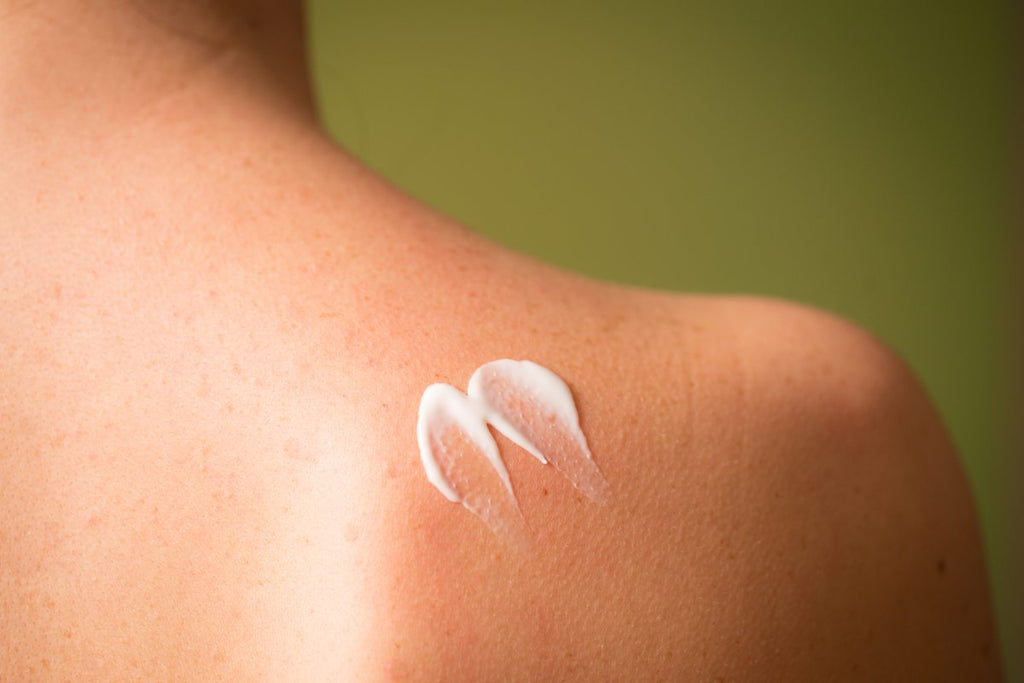THE TRUTH ABOUT SPF AND MOISTURISER

The beautiful, warm and sunny weather that we have been experiencing lately, combined with the increased exposure to the sun that we are getting due to lockdown at home, has once again raised the important topic of SPF.
Why Do We Need to Apply an SPF Daily?
UV rays affect us all the time, 365 days a year and irrespective of the weather. “Even when it’s cold or overcast, UV rays that cause skin aging and skin cancer are reaching your skin,” says Deborah S. Sarnoff, MD, president of The Skin Cancer Foundation.
UVB rays, the main cause of sunburn, are the strongest in the summer. However, UVB rays can burn and damage your skin year-round, especially at high altitudes and on reflective surfaces such as snow or ice. Snow reflects up to 80 percent of the sun’s UV light, so the rays hit you twice, further increasing your risk of skin cancer and premature aging.
UVA rays remain constant throughout the year and can penetrate through clouds and fog. UVA rays can also penetrate glass, so its still possible to damage your skin while spending a bright winter day indoors.
However, we inevitably tend to be more conscious of skin protection during sunny weather. While we may all like the look of being tanned, it is actually the skins way of protecting itself. Our skin produces a dark-coloured pigment, melanin, as a shield against further damage from UV radiation.

Does VOYA have SPF in their Products?
One of the questions we are regularly asked is whether our moisturisers contain an SPF. The answer is no, but the reason behind that may not be commonly understood.
We, of course, recommend the daily use of high factor SPF as a defence from harmful UVA and UVB rays. It is a vital part of our daily health and beauty regime. However, it was a conscious decision on our part not to include it in our products. And here’s why.
Time Savers Aren’t Always the Best Option
In our time-poor society, we are all looking for products that can speed up our daily routines. And who doesn’t like the sound of a bargain? Why buy 2 products when you can buy 1 instead?
Unfortunately, studies have highlighted some issues with using ‘2 in 1’ style SPF products such as moisturisers and foundation. Firstly, it is very important to liberally apply your SPF. Dermatologists recommend using at least half a teaspoon for facial coverage. Whereas facial moisturisers and makeup foundation are used sparingly and in general only a pea-sized amount is recommended. Therefore, you will not be applying enough SPF to benefit from its protection. Also you need a minimum factor of 30, and again most 2 in 1 products will generally only offer a factor of 15. These issues can give you a false sense of security that you are adequately protected.
Moisturiser & SPF's
The core purpose of an SPF is to form a protective barrier on top of the skin to shield it from harmful UV rays. A moisturisers core purpose is to feed the skin with active ingredients to hydrate and strengthen it. If you use them in a combined product then you are reducing the efficacy of your moisturiser as the SPF will limit its absorption and can inhibit the active ingredients in your moisturiser. Instead, you should apply your daily moisturiser first, allow it to absorb for a few seconds, and only then apply your SPF. Thus locking in your moisturiser and creating that all-important protective barrier to your skin.

It’s Science
If you don’t believe us, then listen to the British Association of Dermatologists, who conducted a study highlighting the shortcomings of moisturisers containing SPF. Their research found that the amount of SPF contained in many moisturisers does not offer the full UV protection we really need. The researchers discovered that moisturisers with sun protection factor (SPF) provided less sun protection than the equivalent strength sunscreen in real world scenarios and that people were more likely to miss significant areas of their face when applying a moisturiser when compared to an SPF.
According to Matthew Gass of the British Association of Dermatologists,
“A moisturiser with SPF just doesn’t perform particularly well in real-world situations compared to sunscreen. Although it may say factor 30 on the box, this study is just further evidence that lab testing conditions for these products don’t reflect how they are used.”
Using a specially modified camera that only sees UV light, the researchers from the University of Liverpool assessed how effective sunscreen and an SPF moisturiser were when applied to the face. When an area of skin is successfully covered, the product absorbs the UV light and this area appears black in the photos – the lighter the area the less successful the absorption.
After assessing the pictures, it was found that the faces of those who had applied an SPF moisturiser were comparatively lighter. Which suggests SPF absorption was less successful and therefore less effective. It is believed that those of us who use an SPF moisturiser tend to apply it quite thinly and less uniformly. Therefore, reducing our sun protection by as much as two-thirds in some cases.
VOYA & SPF
The skin is our largest organ and our first line of defence against environmental aggressors like the sun. That is why VOYA advocate using a robust SPF of between 30 to 50 in conjunction with our moisturisers. We are continuing our research to try and develop an organic, reef-friendly sunscreen that will not only offer high protection but will also be user friendly and not leave a thick white cast on the skin, as unfortunately, most organic SPFs do. In the meantime, we are happy to recommend some of our favourite facial SPFs.
Some of our favourites include:
- Kiehl's Ultra Light Daily Defence SPF 50
- La Roche-Posay Anthelios Fluid SPF 30/50
- Skinceuticals Mineral Radiance UV Defence SPF 50


